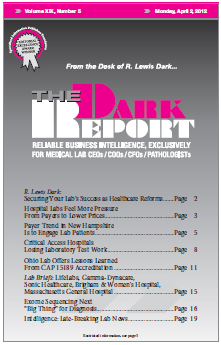CEO SUMMARY: One consequence of a new “site of service” health plan instituted by Anthem Blue Cross and Blue Shield in New Hampshire is that community hospitals—particularly in rural areas—are being asked by patients to collect blood and lab specimens, then send them off to Anthem’s network laboratories. One New Hampshire hospital CEO explains how …
Critical Access Hospitals Losing Lab Test Work Read More »
To access this post, you must purchase The Dark Report.


